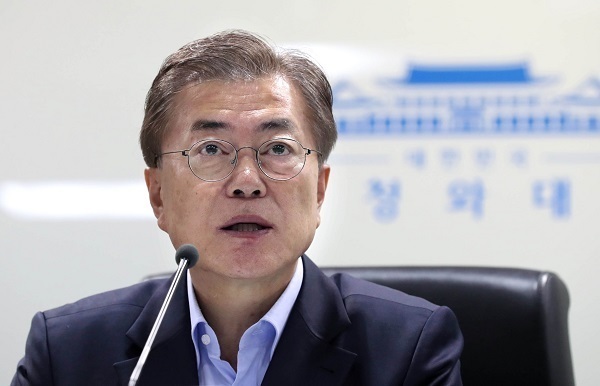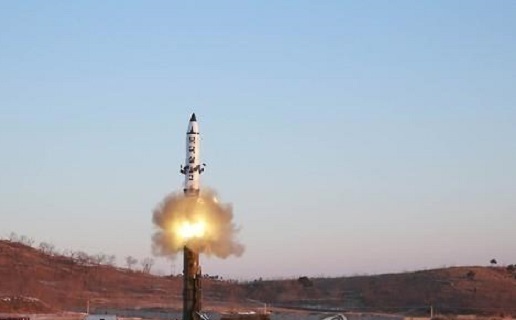Moon Jae-in urges stern response to NK launch
Allies warn N. Korea on missile test
By Korea HeraldPublished : May 14, 2017 - 11:50
President Moon Jae-in on Sunday called for tough countermeasures to North Korean provocations following its latest missile launch.
“The possibility of dialogue is open, but provocations must be met with stern responses to prevent North Korea from making misjudgments,” Moon said at a National Security Council meeting at 8 a.m.
“(Seoul) must show that dialogue is possible only when North Korea changes its behavior.”
The newly elected liberal president has stated on a number of occasions that he would take a softer approach to Pyongyang than his predecessors and that he is open to engaging in dialogue if necessary conditions are met.
“The possibility of dialogue is open, but provocations must be met with stern responses to prevent North Korea from making misjudgments,” Moon said at a National Security Council meeting at 8 a.m.
“(Seoul) must show that dialogue is possible only when North Korea changes its behavior.”
The newly elected liberal president has stated on a number of occasions that he would take a softer approach to Pyongyang than his predecessors and that he is open to engaging in dialogue if necessary conditions are met.

At 5:27 a.m., Pyongyang fired a ballistic missile from North Pyongan Province in the country’s northwestern region. This marks the fifth time North Korea has launched a ballistic missile in the last two months. The four previous launches -- March 22 and April 5, 16 and 29 -- were assessed by Seoul and its allies as having failed.
The missile, which fell into the East Sea after traveling a distance of over 700 kilometers, has not been identified. The US has indicated it may be a new type of ballistic missile.
Shortly after the launch, a US Pacific Command official was quoted by the media as saying that information gathered about the missile does not match that of an intercontinental ballistic missile.
PACOM also said the missile does not appear to be capable of posing a threat to the mainland US.
As the allies analyze the latest launch, the South Korean president ordered Seoul’s military to maintain readiness and to work closely with the US to prepare for “any military provocation” by Pyongyang. Moon also called for the development of the Korean Air and Missile Defense system to be hastened.
“This is a clear violation of the US Security Council resolutions, and a grave challenge against international peace and security,” Moon said.

Later in the day, the US backed Moon’s warnings in a communication between the two sides’ top national security officials.
National Security Office chief Kim Kwan-jin and his US counterpart H.R. McMaster reaffirmed the two sides’ will to cooperate closely in responding to threats and maintain military readiness.
According to Cheong Wa Dae, the two sides also agreed to cooperate closely with the international community to denuclearize North Korea.
Seoul reiterated the warnings in a government statement released later in the day.
In the statement, the Seoul government warned North Korea against further provocations, saying Pyongyang should not “test the will of the international community” for denuclearization of the Korean Peninsula.
“(The South Korean government) once again urges North Korea to cease all provocations and to engage in dialogue for denuclearization,” the government said in a statement.

The Japanese government also reacted swiftly to the development, with Prime Minister Shinzo Abe saying the country would not tolerate such provocations.
“North Korea’s repeated firing of ballistic missiles is a grave threat to the country (Japan), and a clear violation of the UN Security Council’s resolutions,” Abe told the media ahead of Japan’s national security meeting.
He went on to say the Japanese government would work with Seoul and Washington to maintain a high level of readiness and to respond to further provocations.
According to Japanese media, Tokyo’s Defense Ministry suspects Pyongyang employed a different launch method in its latest provocation.
“North Korea’s missile is estimated to have reached altitude of over 2,000 kilometers,” Japan’s Defense Minister Tomomi Inada was quoted as saying by Japanese media.
By Choi He-suk (cheesuk@heraldcorp.com)
-
Articles by Korea Herald



















![[Today’s K-pop] Treasure to publish magazine for debut anniversary](http://res.heraldm.com/phpwas/restmb_idxmake.php?idx=642&simg=/content/image/2024/07/26/20240726050551_0.jpg&u=)